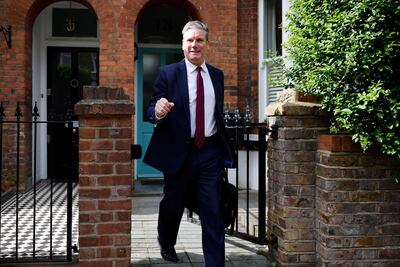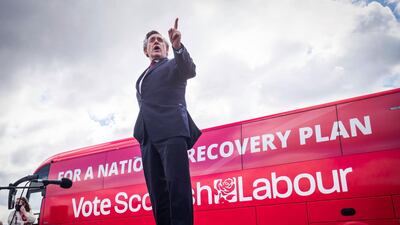Former Labour UK prime minister Gordon Brown said Scottish independence would fail unless it had the overwhelming support of the country.
On Monday Mr Brown launched a campaign to prevent the UK from breaking up after Scotland’s First Minister Nicola Sturgeon upped the ante on independence after her election victory last week.
Ms Sturgeon – whose pro-independence SNP fell one seat short of a majority in the Scottish Parliament – said a second referendum was a matter of "when not if".
However, Mr Brown accused the first minister of lacking details of “what independence actually means”.
He said most Scots would not support independence if potential drawbacks, such as the creation of a new currency and the need for a hard border between Scotland and England, were explained properly.
“Nicola Sturgeon talks a lot about a referendum but she doesn’t explain what independence actually means,” he told Sky News.
“What is the policy for the pound? For pensions? For the border? For trade? All these difficult issues that the SNP have never really addressed and don’t even have a plan for after 300 years of the union.”
In the 2014 referendum, 44.7 per cent voted for independence and 55.3 per cent voted against. Some polls suggest the gap has since narrowed.
But Mr Brown warned the electorate of trouble ahead if independence was to proceed without the vast majority of Scots in support.
“When Norway left Sweden, 99 per cent wanted to leave. When South Sudan was formed, 99 per cent wanted to leave,” he said.
“There is a division in Scotland – it’s almost 50-50 one way or the other. So you’ve got to get an acceptable process that people agree to.”
Mr Brown plans to turn his think tank, Our Scottish Future, into a body that attempts to convince “not yet nationalist” voters of the benefits of remaining in the union, and he suggested British Prime Minister Boris Johnson established a “permanent forum” to strengthen the UK.
“The leaders have got to be discussing the issues they have in common. You can’t just rely on a few phone calls and ad hoc conversations when things get difficult,” he said.

Meanwhile, Labour leader Sir Keir Starmer reshuffled his team in response to the party's disappointing performance in the Super Thursday elections.
Labour lost control of a number of local authorities and of the parliamentary seat of Hartlepool, a Labour bastion for decades. It held on to city halls in London, Manchester and elsewhere, but those successes could not mask its retreat in areas that used to be party strongholds.
Rachel Reeves became shadow chancellor, replacing Anneliese Dodds who became party chairwoman and head of policy review.
Angela Rayner, who was sacked on Saturday as party chairwoman and campaign co-ordinator in a move that went down badly in Labour ranks, was appointed policy chief on "the future of work".
She was bestowed the title of shadow first secretary of state, the equivalent of deputy prime minister in Mr Starmer's shadow cabinet.
Several party figures criticised the removal of Ms Rayner as party chairwoman. She comes from a working-class background in northern England – precisely the demographic Labour is losing and needs to win back.
Shabana Mahmood, appointed Labour's campaign co-ordinator in the reshuffle, said the party would review its policies.
"There has to be a policy review process which we are now going to embark on together as a movement to try and work out the programme that we need to be offering the country," she said.
"It has to be a platform that speaks to the public."

